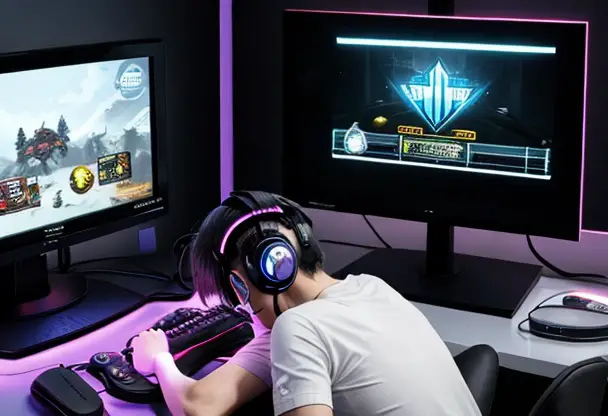In a world where gaming has become an integral part of entertainment and leisure, managing gaming time has become a crucial aspect of maintaining a balanced lifestyle. Excessive gaming can lead to a range of consequences, from strained relationships to compromised mental and physical health. This guide aims to provide practical strategies for individuals seeking to limit their gaming time while still enjoying this popular pastime responsibly.
Understanding the Reasons Behind Excessive Gaming
Before embarking on the journey to limit gaming time, it’s essential to understand the underlying motivations for excessive gaming. For many individuals, gaming serves as a form of escape from stress or daily challenges. Recognizing the impact of gaming on daily life, including relationships, work, and overall well-being, is a crucial first step in addressing excessive gaming habits.
Setting Clear Goals and Priorities
To effectively manage gaming time, individuals need to define their personal and professional goals. This involves establishing priorities in daily life and aligning gaming time with these broader objectives. By clearly identifying what matters most, individuals can create a framework for making informed decisions about the time they allocate to gaming.
Creating a Realistic Gaming Schedule
One practical approach to limiting gaming time is to create a realistic gaming schedule. This involves allocating specific time slots for gaming and setting reasonable daily or weekly limits. Consistency is key in adhering to the established schedule, reinforcing discipline and preventing unplanned gaming sessions from disrupting other aspects of life.
Utilizing Gaming Time Management Tools
Gaming platforms and external apps offer various tools designed to assist in managing gaming time. Built-in features on gaming platforms often include settings for monitoring and limiting playtime. External apps provide additional functionalities, such as tracking usage patterns and sending reminders. Setting alarms or reminders to signal the end of gaming sessions can be particularly helpful in sticking to predetermined limits.
Introducing Alternative Activities
Reducing gaming time becomes more manageable when individuals discover alternative activities that captivate their interest. Identifying non-gaming hobbies and pursuits, such as reading, exercising, or learning a new skill, provides fulfilling alternatives. Diversifying leisure activities not only limits gaming time but also contributes to personal growth and a more balanced lifestyle.
Establishing Boundaries and Communication
Effective communication with family and friends is crucial in the quest to limit gaming time. By openly discussing gaming limits and personal goals with loved ones, individuals can gain the support needed to enforce boundaries. Setting clear expectations and sharing the reasons behind the decision to manage gaming time fosters understanding and encourages a supportive environment.
Implementing Technology-Free Zones and Times
Creating designated areas or times without electronic devices, including gaming consoles and computers, helps establish a healthy balance. This approach promotes relaxation, quality sleep, and reduces screen time, contributing to overall well-being. Designating specific times for technology-free activities, such as family dinners or bedtime, enhances the effectiveness of this strategy.
Tracking and Reflecting on Gaming Habits
Keeping a journal of gaming activities allows individuals to track their habits and reflect on their gaming experiences. Recording emotions, behaviors, and the circumstances surrounding gaming sessions provides valuable insights. Regular reflection can lead to adjustments in the gaming schedule, helping individuals tailor their approach to better align with their goals and priorities.
FAQs
- Is it necessary to completely quit gaming to manage time?
- No, it’s not necessary to quit gaming entirely. Managing gaming time involves setting reasonable limits and prioritizing other aspects of life.
- How can I overcome the urge to exceed the set gaming limits?
- Implementing gradual changes, seeking support from friends or family, and understanding the reasons behind the urge can help in overcoming it.
- Are there specific gaming genres or platforms that encourage responsible gaming?
- Some genres and platforms offer features that promote responsible gaming, such as time-tracking tools and reminders.
- Can managing gaming time positively impact mental health?
- Yes, finding a balance in gaming time can contribute to better mental health by reducing stress, improving sleep, and fostering a sense of accomplishment in other areas of life.
- Should I seek professional help if I struggle to limit gaming time on my own?
- If self-management becomes challenging, consulting a mental health professional or addiction specialist can provide additional strategies and support.
Conclusion
In conclusion, managing gaming time is a journey that requires self-awareness, discipline, and a commitment to overall well-being. By understanding personal motivations, setting clear goals, and utilizing practical strategies, individuals can strike a balance that allows them to enjoy gaming responsibly while fulfilling other aspects of their lives. The key is moderation, mindfulness, and a conscious effort to prioritize what truly matters. Through these measures, individuals can navigate the world of gaming with intention and lead a more balanced and fulfilling lifestyle.
Also Read Latest Posts
How Gaming Affects Learning in College
How to Deal with Child Gaming Addiction
Why Understanding the Psychology of Mobile Gaming Can Help You Manage Playtime Effectively?
Why and How to Avoid Common Mistakes in Mobile Games with This Beginner’s Guide to Success?

